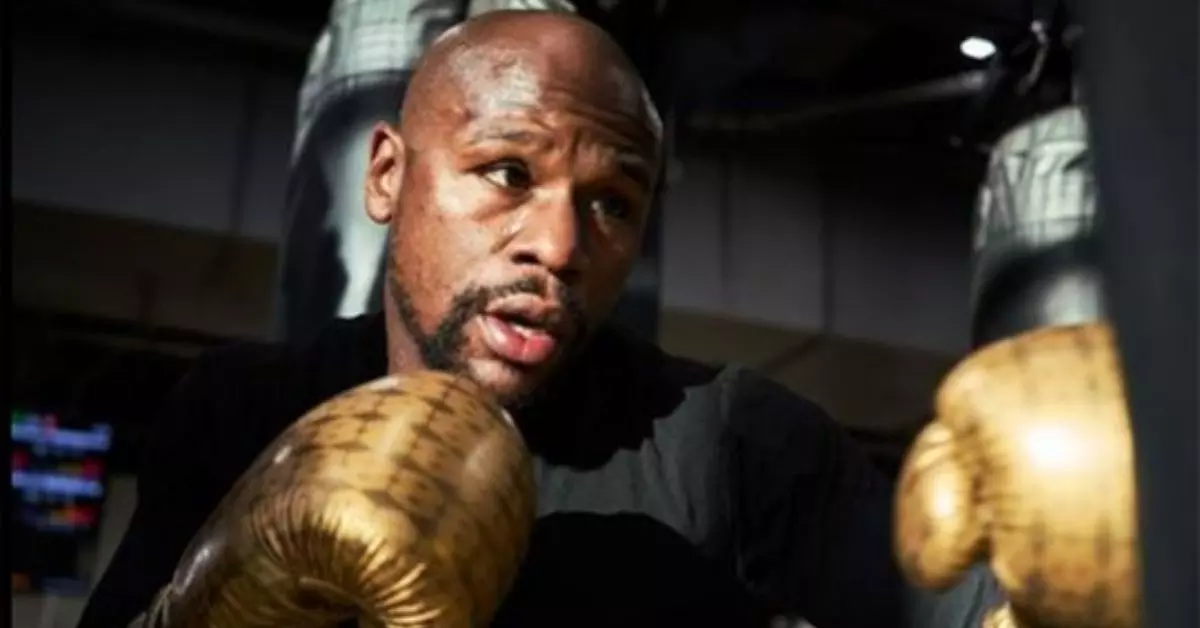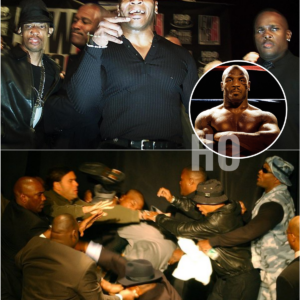NO FIGHTER SMARTER THAN ME : 10 Minutes Of Floyd Mayweather Perfecting The Sweet Science | HO
In the match, Mayweather is described as facing significant adversity but impressing with his defensive skills and slick movements. Despite De La Hoya’s efforts, Mayweather’s defensive prowess and effective counter-punching are highlighted.
The commentator expresses admiration for Mayweather’s abilities and acknowledges the intensity and excitement of the fight. The mention of Ricky Hatton at the end might refer to a desire for Mayweather to face Hatton in another match, suggesting anticipation for future boxing events.
WATCH VIDEO BELOW:
10 Floyd Mayweather Boxing Tricks
1. High Elbow Block
Floyd’s first “trick”, holding the high left elbow on the inside. Being that I copied this move from Floyd, I can’t help but notice every time he does it. What he’ll do is stick out his left elbow when he’s on the inside or wanting to march inside. The proper way to use this move is to have your hips high, your left shoulder high, and then your left elbow high. Having your hips elevated allows you to lean onto your opponent for maximum annoyance. Assuming you’re close enough (and clever enough), you can simply walk down your opponent and quickly render his right hand useless immediately. Once on the inside, throw your own right hand or just lean on your opponent all day long and tire him out.
The high left elbow is effective for blocking right hands on the inside since the right hand always has to come at a loop when you’re that close. All you have to do is stick that left elbow out and you can block all types of right hands along your forearm. It’s more effective than having your elbow down and hand up because the hand, which isn’t back by anything, can be easily pawed away or punched right through.
Having the left elbow high and left hand down also makes it easy for you to block shots aimed at your mid-section. If you think about it, it can be pretty hard to block shots coming straight into your belly if you’re using a high guard and have two elbows blocking the front of your stomach. Your elbows don’t really block in the center unless you’re consciously pulling them together–which can be more energy-consuming for bigger guys. Having a hand down there allows you to fully bar off more of the mid-section and decrease the chances of you getting caught with a big body shot in close.
2. Head Pull
Another inside-fighting trick by Floyd Mayweather. Constant head-pulling. He does it after missed punches or even when he lunges inside after a punch. Sometimes he uses his arms, other times he simply leans over his opponents and crushes them with his upper body. Mosley did complain after the fight that Floyd tired him out very quickly by always hanging on his head, which wore down his neck and shoulders faster.
The key thing to notice is that Floyd pulls down the opponent’s head as a aggressive-defense move. He does it immediately after he misses a punch so that his opponents aren’t able to counter immediately. This allows him to potshot all day long without worrying about retaliation. Floyd is forever forced to use this move because many of his opponents swarm on the inside since they’re not fast enough to potshot against him from far.
3. Shoulder Roll
How could I ever forget this? These are Floyd’s signature trademark moves. You’ve seen him do it on the mitts and countless of times in the ring. In tribute to all the highlight videos you’ve ever seen of Floyd, I present you with yet even more shoulder rolls.
Nothing special to look for, just notice that in some cases, he goes under the left hook after throwing his own right hand. In other cases, he rolls away from the left hook and catches on the back of his right shoulder (there might not be footage of this in my video). As for Mosley’s right hands, you’ll see Floyd chop it away by rolling his left shoulder into it OR block it by shielding his chin with his left shoulder. Naturally a counter-right hand always follows. Here it is again in all its glory–the Floyd Mayweather shoulder rolls!

4. High-Guard, Drop-Jab
There are 2 parts to this trick. The first part is understanding why Mayweather puts both his hands up. From the footage I’ve studied, he’s doing it to act as though he’s going on the defensive. This accomplishes 2 things: ONE, is that his jabbing hand is now even closer to his opponent and TWO, he is giving his opponent a false sense of security. Many of his opponents will ponder over the next few precious seconds about either of the following:
What’s Floyd up to? Why are his hands up?
Floyd’s on the defensive! Let’s attack him!
Looks like I’m doing good, he’s putting both hands up!
But what happens next? It’s too late because this is where he performs the second part of the trick: the drop-jab! I made up this term, it’s kind of like a pawing jab but with a bit of power. It’s different from a regular jab in that it’s pawed out in a downwards motion with his arm and more emphasized on speed. To explain how it works and why it’s effective, I’ll briefly explain how most jabs are thrown.
Typically when a boxer throws a jab, the shoulder is activated and the jabbing arm is launched in a forward springing motion from the shoulder. So when you’re facing a regular jab, you’ll see a quick bounce in the opponent’s shoulder and then his whole arm springing straight at you like a snake. A pawing jab is lighter version of the jab where boxers will throw quick and light jabs at each other in a pawing motion–similar to how a cat will paw the air. Pawing jabs are meant for measuring distance and to basically start the fight off by being able to touch your opponent. Once you’ve established contact, you’ll move on to the harder, bigger punches.
Now back to Floyd Mayweather’s drop-jab tactic. What Floyd does is hold that left hand high into the air which elevates the left elbow high into the air minimizing the amount of movement he has to make to connect. When Floyd throws the drop-jab, there is much less detectable movement in the left arm because the shoulder is already elevated, which turn makes the drop-jab so much harder to detect. Since the arm is already almost extended, Floyd only has to claw downwards with his fist to fully extend his arm. Of course, Floyd is one of the fastest boxers ever and before his opponents realize it, he’s already slapped them with a lightning fast drop-jab. Combine that lightning fast drop-jab with his high-guard’s element of surprise and you have a surprise punch that keeps working over and over.
Mayweather gets away with this trick over and over and over again. Just watch him in any of his fights. As soon as the left hand goes up, it quickly comes down with a fast pawing jab. In some cases when his opponents begin to catch on, Floyd switches things up by going back to jabbing from the bottom…and so he launches the jab before it’s raised all the way. Real subtle stuff, you gotta look out for it.
5. Forearm Crush
Ahhhh, yes–the forearm crush. I’m seriously tempted about doing a whole movie on the forearm crush.
Sometimes I think Mayweather is grappling more often than punching. Here’s how this works: anytime Mayweather misses a punch, he’ll fall in with it and use the forearm of the punching arm to bar against his opponent’s neck and make it hard for him to counter. So if Mayweather misses a jab, he’ll shove the left forearm against his opponent’s neck to keep him from lunging back with a big counter. Same thing with the right hand, when Floyd misses the right hand, he’ll shove his right forearm against his opponent’s neck.
If you watch Floyd’s footage, you will notice him falling into his opponent’s after every right hand. He’ll throw a right, and then walk right in and crush his opponents with his forearms. I’ve seen him do it to perfection against Zab Judah and Ricky Hatton. It is for this reason that they seem helplessly unable to counter against his right hands. On many occassions, Mayweather will also use his other arm to grab his opponent’s arm as he’s doing a forearm-crush. Unfortunately for Mosley, he too was a victim of this tactic. Mayweather did this at least 10-20 times in every round against Mosley!
This is Floyd’s number one move. Perhaps even more devastating to his opponents than the shoulder roll, because this move quickly wears out his opponents and also minimizes their ability to attack him. In some cases, he’ll even pull on Mosley’s left arm sucking him into the forearm crush. In close, Mayweather doesn’t always lean into the forearm but he holds it there as a shield, keep Mosley from throwing a punch over it. The forearm holds down Mosley’s weight so he can’t explode into a body shot either.
Very VERY annoying tactic, as you can see. Mayweather doesn’t always have to lean, just leaving it there will activate Mosley’s muscle and occupy his mental focus on it. You just need to touch a guy for him to think about a certain area – you don’t necessarily have to apply force. You’ll see Mosley try to punch over that forearm but the problem is that the forearm doesn’t allow him to punch straight at Mayweather. Mosley has to throw a right hook or angled right hand over it, which Mayweather avoids easily by just pulling his head straight back.
6. Leaning Right (aka Pull Counter)
This is something Muhammad Ali use to do! The leaning right is another one of Mayweather’s favorite counter-punching tactics. He’ll lean his body forward which usually baits his opponent into throwing a punch. Mayweather then easily avoids the punch by pulling his head back, arching his back, and then come back with a right hand counter. He pulls only his head and upper body back, keeping his lower body close so that he’ll still be in punching range once he recovers his upper body. Whether or not the right hand lands, you can bet the forearm crush is on its way.
(The difference between Floyd’s leaning right and Ali’s “Leaning Right” is that Floyd does it from a stationary position, whereas Ali was able to do this while moving (how incredibly annoying, I know!)
7. Opening Guard
The opening guard is nothing new in the fight game. I’ve seen many slick boxers do it. The reason why you have to be slick is because it requires you to avoid a punch entirely by not even touching or blocking it. Slipping punches with your head is easy, but slipping punches with the body is much more difficult–requires a bit of footwork and good distance control. Assuming you’ve got the skills, all you have to do is open your guard and let the punch miss by hitting nothing but air.
The opening guard is used for 3 reasons:
Better Counter-Punching Opportunities: if you’re avoiding a punch entirely, that means you have 2 free hands to counter-punch with. The HUGE advantage is that your opponent is hitting air, which means his body is left vulnerable for a longer period as he’s still falling through the air over-committed to his missed punch which gives you more time to counter-punch him.
Maintaining Mobility (especially for defense against body punches): There are several reasons why moving boxers don’t like to block body punches. One typical reason is that body punches are hard grounded punches. The only way to block a hard body punch without falling off balance is to properly ground yourself. It is for this reason that many trainers will tell their fighters to aim for the body when they want to trap a moving opponent. When you force a boxer to defend a body shot, he’ll have less chance of escaping since he has to stand his ground and block (because slipping a body shot is hard). Obviously, if you’re a boxer that likes to move around, grounding yourself is not something you want to do! If you block a body shot and get stuck in one spot, your opponent can now follow up with shots to your head. Hard punches to the head cannot always be fully blocked. Even if you cover up, the punching power can still penetrate your glove and force you to absorb partial damage. Worst of all, is that you’re still stuck in the corner or along the ropes.
Distance Control/Trickery: A tricky advantage to the opening guard is to make your opponent lunge. They think they’re only an inch short and so they’ll lunge on the next shot which makes it even easier for you to counter-punch them back.
Nonetheless, I included some nice clips of Floyd avoiding body shots by moving out of the way entirely. Slick movement!
8. Push Tactics
Why is this even considered a trick?! Isn’t pushing so much easier than a punch? The answer is YES. I consider this a trick because Mayweather is using an outstretched arm to push instead of punch. Can you ever imagine a situation where you would take the risk getting caught by a fast punch while you try to push your opponent?
There are 2 places you can push an opponent:
The Head – The head is a lever that controls the rest of the body. Pull a head down and all his punches aim at the ground, push a head up and all the punches fly into the sky.
The Shoulder – The best time to push a shoulder is when your opponent is leaning back. Instead of trying to jab him and risk the chance of him countering hard (all his weight on that dangerous back hand!), you can just push his shoulder instead and he will fall backwards into a vulnerable position.
The concept seems simple enough but why am I calling it a trick? You just have to understand that although pushing is not allowed, nobody can really tell the difference if you make it look like a light punch or a slow punch.
Mayweather’s always looking for an escape. Instead of always punching his way out, he knows that all he has to do is push at his Mosley’s face at the right time and it will direct his punches harmlessly into the sky. At other times, Mayweather will pretend to throw a punch and then while Mosley is bracing for the impact, Mayweather will just push him into the ropes and gain some ground. There are times when I see Mayweather drop his hands and push his opponents at their waist—his head is open momentarily but his opponents can’t do anything since they’re falling off balance. It’s clever and actually pretty funny.
9. Head & Hooks
It’s all in the head! Mayweather drops his head for offensive AND defensive reasons. Dropping his head in puts an extra force on his opponents. Notice that Mayweather is pushing with his head but not leaning in (which is a critical mistake that leaves you open to uppercuts). Since their head is too high to push his out of the way, they have to sacrifice an arm to move his head. When the opponent lifts their arms to go for his head, his hooks to the body land. If you watch his training videos, you’ll see him practicing this move on the bag quite a bit. You’ll also see him practice this move against his big friend that wears the body protector.
In fights, I’ve seen Mayweather transition to this when he misses a shot. He transitions into a head push if he can’t get high enough to hold them down with his forearms. At other times when there’s no space, he puts his head in to make room for his hooks. I’ve also seen him combine this with an arm grab to spin his opponent. The move isn’t unique to Mayweather. I’ve seen Bernard Hopkins and Timothy Bradley use similar tactics. The top of your head is definitely more punch resistant and as long as you can fight a little “blind” and know how to feel your way around the inside, it’s a good move.
10. Slap Hook on the Inside (aka Check Hook)
The slap hook–another one of Floyd Mayweather’s favorites. Sometimes he throws fully committed hard-fisted left hooks (or “check hooks”) and other times he throws “slap-hooks” just to make some quick connects and disrupt his opponents’ rhythm. Against Mosley, you will notice 2 key moments when Floyd uses his slap hooks: one is when Mosley ducks The other is when Mosley tries to come inside. Mayweather also destroyed Ricky Hatton using this move over and over.
That’s all it is–Floyd throws some quick little hooks, disrupts Mosley’s rhythm and puts him on the defensive. Floyd then steps around him like a matador or connects with some bigger punches.
In the video, you can tell it’s a slaphook because Floyd isn’t fully committing his body and pivoting his whole body when the throws the hook. The first hook is just to connect and disrupt, the second one will be the one where he commits his body to it.
Conclusion: Floyd Mayweather CAN FIGHT ON THE INSIDE!
So what have we learned? Floyd Mayweather Jr is actually a pretty good in-fighter! Now doesn’t that make a whole lot of sense?! All these years, one boxer after another has tried to beat Floyd by pressuring him on the inside but did any of them come close? NOPE! The boxers that gave Floyd the most trouble were De La Hoya, Castillo, and Judah–and they all did it by chasing him down but boxing from the OUTSIDE!
Another thing I must remind everyone about Floyd, even though everyone already knows, is that Floyd relies very heavily on speed and accuracy. Many of his punches are backed only by the element of surprise and nothing else. He throws them without much power but they cause damage because of their brutal accuracy and perfect timing. It would be hard to imagine a slower fighter being anywhere near as successful with “drop-jabs” and pitty-pat “slap-hooks”.
If you’re going to beat Floyd, you’ll have to stay away from the inside where he’ll shove you around and lean on you with those forearms all day long. Shane Mosley complained in numerous post-fight interviews that his neck was worn out by all the grabbing and holding Floyd did on the inside. Ricky Hatton also mentioned in the post-fight interview that Floyd was very clever with his forearms. I hope you guys enjoyed this video and learned some new insight to Floyd Mayweather and the boxing fight game.
News
‘I’m really embarrassed with myself and my life’: Mike Tyson on Where’s His $400 Million Dollars | HO
‘I’m really embarrassed with myself and my life’: Mike Tyson on Where’s His $400 Million Dollars | HO Tyson became one of the most high-profile and wealthiest sportsman on the planet – but staggering financial mismanagement meant he filed for…
CLINK FLOYD – Mayweather’s 60-day prison hell as he survived on Snickers, paid gangsters for protection, and feared jailer was out to get him | HO
CLINK FLOYD – Mayweather’s 60-day prison hell as he survived on Snickers, paid gangsters for protection, and feared jailer was out to get him | HO FLOYD MAYWEATHER needed to pay for protection and constantly moaned about conditions during his…
OSCAR DE LA HOYA CALLS OUT FLOYD MAYWEATHER Makes $100 Million Offer!!! | HO
OSCAR DE LA HOYA CALLS OUT FLOYD MAYWEATHER Makes $100 Million Offer!!! | HO Oscar De La Hoya is gunning for a fight with one of the greatest boxers of all-time, Floyd Mayweather, telling TMZ Sports he’s got $100 MILLION for Money if he…
Floyd Mayweather REACTS to Ryan Garcia N-Word R₳CIST RANT; Shuts down “NEGATIVITY” to PRAISE Moton | HO
Floyd Mayweather REACTS to Ryan Garcia N-Word RACIST RANT; Shuts down “NEGATIVITY” to PRAISE Moton | HO Ryan Garcia is looking to boxing legend Floyd Mayweather in order to resuscitate his flagging career in the ring — but right now, it is proving…
Smartest move tank has ever made! Floyd Mayweather RESPONDS To Gervonta Davis CALLING HIM OUT To Fight! | HO
Smartest move tank has ever made! Floyd Mayweather RESPONDS To Gervonta Davis CALLING HIM OUT To Fight! | HO The relationship between Floyd Mayweather and Gervonta “Tank” Davis has been a rollercoaster of highs and lows, marked by moments of…
Mike Tyson HD get him a straight jacket put your mother in a straight jacket Lewis press conference | HO
Mike Tyson HD get him a straight jacket put your mother in a straight jacket Lewis press conference | HO “Get him a straitjacket!” That’s how all this craziness started. In 2002, boxing writer Mark ‘Scoop’ Malinowski stood at the…
End of content
No more pages to load











